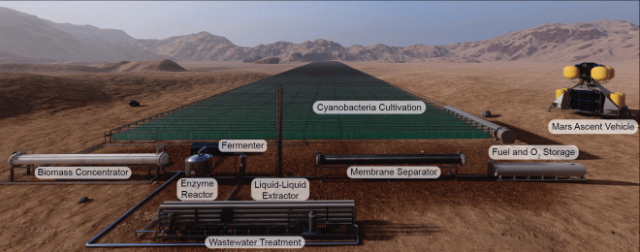
The factory on Mars
Researchers from the Georgia Institute of Technology have proposed a concept following which bacteria delivered to Mars will be able to produce rocket fuel and liquid oxygen from the CO2 available there. The resulting fuel will be useful for refueling the spacecraft to return to Earth. Techcult has studied in detail the scientists' article in the journal Nature.
It is expected that no later than 2030, a rocket will depart from Mars, carrying 500 grams of geological samples found by NASA's Perseverance robotic rover. Despite the fact that the rocket will send a container with them to Mars orbit, from where they will be picked up by another aircraft to return home, the weight of the rocket will be about 500 kg, the vast majority of which will take solid fuel needed for lifting. How much fuel will be needed for subsequent, more ambitious missions to Mars, moreover, if astronauts take part in them. According to Georgia Tech research, 30 tons of methane and liquid oxygen are needed to put half a ton of payload into orbit. Even if it is possible to obtain liquid oxygen on Mars, methane will still have to be brought from Earth. It turns out that the primary payload from Earth will weigh 400-600 tons, and the delivery of additional fuel will cost US $ 9 billion. To reduce costs and space on board for something more efficient, a group of scientists led by Nick Kruyer suggests using cyanobacteria and genetically modified E. coli to produce biofuel 2,3-butanediol (CH3CHOH)2. The substance is already used on Earth for the preparation of synthetic rubber and various polymers. In addition to preparing the right amount of oxygen for the rocket, the technology will provide 45 tons of additional oxygen for various purposes.

Photobioreactor
The idea is that there will be several research campaigns before the main mission. They will include the delivery of microorganisms and plastic components to create photobioreactors the size of several football fields. In the reactors, sunlight and carbon dioxide from the atmosphere will mix with cyanobacteria, which will then be processed with enzymes to produce sugar. The extracted sugar will go to feed the E. coli, which in turn will produce 2,3-butanediol and oxygen. Theoretically, the process will be 30% more efficient than a possible chemical plant to produce oxygen by catalysis using methane supplied from Earth, although it will be somewhat more complicated. Scientists see the development of smaller and heavier equipment as a further step, as well as the modernization of the biological process to increase its efficiency.
